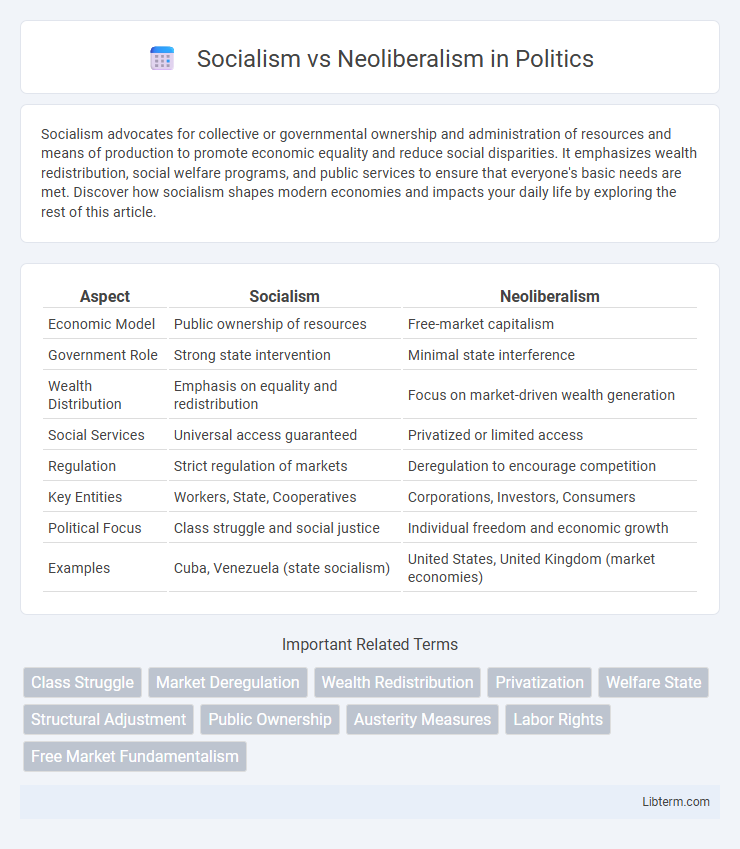Socialism advocates for collective or governmental ownership and administration of resources and means of production to promote economic equality and reduce social disparities. It emphasizes wealth redistribution, social welfare programs, and public services to ensure that everyone's basic needs are met. Discover how socialism shapes modern economies and impacts your daily life by exploring the rest of this article.
Table of Comparison
| Aspect | Socialism | Neoliberalism |
|---|---|---|
| Economic Model | Public ownership of resources | Free-market capitalism |
| Government Role | Strong state intervention | Minimal state interference |
| Wealth Distribution | Emphasis on equality and redistribution | Focus on market-driven wealth generation |
| Social Services | Universal access guaranteed | Privatized or limited access |
| Regulation | Strict regulation of markets | Deregulation to encourage competition |
| Key Entities | Workers, State, Cooperatives | Corporations, Investors, Consumers |
| Political Focus | Class struggle and social justice | Individual freedom and economic growth |
| Examples | Cuba, Venezuela (state socialism) | United States, United Kingdom (market economies) |
Origins and Historical Context of Socialism and Neoliberalism
Socialism originated in the early 19th century as a response to the Industrial Revolution's social inequalities, emphasizing collective ownership and wealth redistribution to address class struggles. Neoliberalism emerged in the mid-20th century, particularly after the 1970s economic crises, advocating for free-market capitalism, deregulation, and reduction of state intervention to promote economic growth. The historical context of socialism rooted in labor movements contrasts with neoliberalism's foundation in global economic shifts and the decline of Keynesian economics.
Core Principles of Socialism
Socialism centers on collective ownership and equitable distribution of resources aimed at reducing economic inequality and ensuring social welfare. It emphasizes democratic control over production means to prioritize public good rather than individual profit maximization. This contrasts with neoliberalism's focus on free markets, privatization, and limited government intervention in the economy.
Fundamental Tenets of Neoliberalism
Neoliberalism emphasizes free-market capitalism, deregulation, and minimal state intervention to promote economic growth and individual entrepreneurship. It advocates for privatization of public assets, reduction of trade barriers, and fiscal austerity to enhance efficiency and global competitiveness. The core belief is that market forces, when unimpeded, create optimal resource allocation and innovation.
Economic Policies: Redistribution vs Market Freedom
Socialism emphasizes economic policies that prioritize redistribution through progressive taxation, social welfare programs, and public ownership to reduce inequality and provide universal access to essential services. Neoliberalism advocates for market freedom, promoting deregulation, privatization, and reduced government intervention to enhance competition and economic efficiency. These contrasting approaches define the core debate between state-led equity efforts and market-driven growth strategies.
Role of Government: Intervention vs Deregulation
Socialism advocates for extensive government intervention in the economy to ensure wealth redistribution, social welfare, and regulation of industries to protect public interests. Neoliberalism emphasizes deregulation, reducing government control to promote free markets, competition, and individual entrepreneurship. The role of government in socialism centers on correcting market failures and achieving economic equality, while neoliberalism prioritizes minimal state interference to foster innovation and economic growth.
Social Welfare and Public Services
Socialism emphasizes comprehensive social welfare programs and robust public services funded through progressive taxation to ensure equitable access for all citizens. Neoliberalism promotes limited government intervention, prioritizing market-driven solutions and privatization, which often results in reduced public service funding and increased reliance on private providers. The contrasting approaches impact the quality, accessibility, and equity of education, healthcare, and social safety nets.
Impact on Income Inequality and Social Mobility
Socialism emphasizes wealth redistribution and state intervention to reduce income inequality, aiming to create a more equitable society through progressive taxation and extensive social welfare programs. Neoliberalism prioritizes free-market policies, deregulation, and privatization, often resulting in increased income disparity and limited social mobility due to reduced social safety nets. Empirical studies show socialist-leaning countries tend to have lower Gini coefficients and higher rates of upward social mobility compared to neoliberal economies.
Global Influence: Adoption and Adaptation Worldwide
Socialism's global influence is marked by its adoption in countries emphasizing wealth redistribution and state intervention, notably in parts of Latin America, Scandinavia, and East Asia, where mixed economies blend social welfare with market mechanisms. Neoliberalism has driven widespread policy reforms worldwide, promoting deregulation, free trade, and privatization, significantly reshaping economies in the United States, United Kingdom, and emerging markets like India and Chile. These competing ideologies continue to shape international economic institutions such as the IMF and World Bank, influencing development strategies and governance models across diverse regions.
Criticisms and Contemporary Challenges
Socialism faces criticism for inefficient resource allocation and lack of incentives for innovation, often leading to bureaucratic stagnation and reduced economic dynamism. Neoliberalism is challenged by growing income inequality, market failures, and decreased social safety nets, prompting debates over deregulation and privatization consequences. Contemporary challenges for both ideologies include addressing climate change, globalization impacts, and balancing economic growth with social equity.
Future Prospects: Evolving Trends in Political Economy
The future prospects of socialism and neoliberalism reflect evolving trends in political economy, with increasing debates over wealth inequality and environmental sustainability shaping policy directions. Socialist models emphasize public ownership and social welfare expansion, aiming to address systemic economic disparities through state intervention. Neoliberalism, favoring market deregulation and free trade, faces challenges from growing calls for regulatory reforms and social protections in response to neoliberalism's impact on labor markets and social equity.
Socialism Infographic

 libterm.com
libterm.com